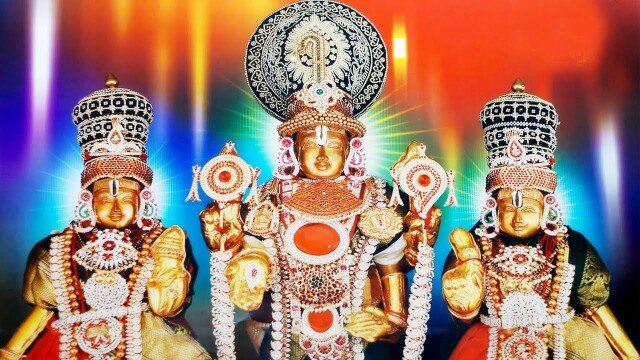Veṅkaṭēśvara (Telugu: వెంకటేశ్వరుడు, Tamil: வெங்கடேஸ்வரர், Kannada:Sanskrit: वेंकटेश्वरः) also known as Govindā, Śrinivasā, Bālāji, Veṅkaṭā, Vasudevā, and Veṅkaṭācalapati, is a form of the Hindu god Vishnu. According to the Hindu scriptures, Vishnu out of love towards his devotees, incarnated as the supreme form of Venkateswara. Venkateswara’s most prominent shrine is the Tirumala Venkateswara Temple located in Tirupathi in the Chittoor district of Andhra Pradesh in Southern India.
The temple is located upon a range of seven hills representing the seven heads of Adisesha, thus earning the name Seshachalam. The seven peaks are called Seshadri, Neeladri, Garudadri, Anjanadri, Vrushabhadri, Narayanadri and Venkatadri. The temple is on Venkatadri (also known as Venkatachala or Venkata Hill) the seventh peak and is also known as the “Temple of Seven Hills”, and the abode of the presiding deity. The temple lies on the southern banks of Sri Swami Pushkarini, a holy water tank. The temple complex comprises a traditional temple building, with a number of modern queue and pilgrim lodging sites. The temple is amongst the richest and the most visited holy place in the world. It is important to look at the significance of this auspicious day from the spiritual angle.
The demon Muran stands for the Rajasic and Tamasic qualities in people, attributed to lust, passion, inertia, arrogance etc. When one conquers these tendencies, one attains the purity of mind, Satva, indispensable for attaining of moksha, the liberation or realization of the self.
For realizing the self as pure awareness, purity of mind is required. Fasting helps to keep at bay tendencies which could be triggered by intake of certain foods. Keeping vigil in the night is symbolic of awareness, or being watchful of the contents of the mind. When the mind is looked at, it becomes still. To abide in the stillness is to attain freedom or peace, acquired through merging of the mind with the self. This is symbolic of the mind automatically being absorbed at the sight of Vishnu after the arduous fast and vigil.
The belief that rice is prohibited, because Muran dwells in it, symbolically signifies that the eating of rice makes one feel heavy and hampers the vigil. This signifies that entertaining negative tendencies could hamper one’s progress towards awareness or consciousness.
Raghavendra Swamy Songs – Dyanaguru Sri Raghavendra – JUKEBOX
4.85K Views0 Comments10 Likes
For Unlimited Devotional Songshttps://www.youtube.com/channel/UCQlh660XHM2YKhtFHrw6I4A?sub_confirmation=1LIKE us on FACEBOOKhttps://www.facebook.com/Bhakthii?sk=app_212104595551052More Videos
Viyazhan Thorum – Dyanaguru Sri Raghavendra – Devotional Songs – Bakthi Jukebox
659 Views0 Comments1 Likes
Subscribe for Unlimited Devotional Songs :-https://www.youtube.com/channel/UCwrp8tAcFsP3FplC8u6IQMAFor More Videos :-https://www.youtube.com/channel/UCwrp8tAcFsP3FplC8u6IQMA
Mantralaya Sri Raghavendra Swami Darshanam
1.18K Views0 Comments7 Likes
For Latest Devotional videos Updateshttp://www.facebook.com/adityamusichttp://twitter.com/#!/adityamusicTo Watch Telugu Free Movies Log on
TV1_AARADHANA-8TH MARCH 2011
553 Views0 Comments1 Likes
AARADHANA,TV1TELUGU,TV1AP,TV1 DEVOTIONAL PROGRAMME,ANJANEYA SWAMY,HANUMAN,SON OF ANJANA,VEERA ABHAYA ANJANEYA,ANJANEYA POOJALU,BHAKTHI,SANSKRUTHI,ARADANA,PANCHANGAM,DEVUDU,GOD SHOW,POOJA,DEVOTIONAL SHOWSAMMAVARUSAMPRA...
Sri Raghavendra Swamy Songs – Kodimalar Pookum – Rajane Guru Rajane
2.09K Views0 Comments8 Likes
For Unlimited Devotional Songshttps://www.youtube.com/channel/UCQlh660XHM2YKhtFHrw6I4A?sub_confirmation=1LIKE us on FACEBOOKhttps://www.facebook.com/Bhakthii?sk=app_212104595551052More Videos
Valloon Vagutha || Dyanaguru Sri Raghavendra || Devotional Songs || Bakthi Jukebox
770 Views0 Comments1 Likes
Subscribe for Unlimited Devotional Songs :-https://www.youtube.com/channel/UCwrp8tAcFsP3FplC8u6IQMAFor More Videos :-https://www.youtube.com/channel/UCwrp8tAcFsP3FplC8u6IQMA
TV1_AARADHANA-12thFEB2011
440 Views0 Comments0 Likes
AARADHANA,TV1TELUGU,TV1AP,TV1 DEVOTIONAL PROGRAMME,RAGHAVENDRA SWAMY,RAGHAVENDRA SWAMY POOJALU,BHAKTHI,SANSKRUTHI,ARADANA,PANCHANGAM,DEVUDU,GOD SHOW,POOJA,SAMPRADAAYALU,DEVOTIONAL SHOWS,RAGHAVENDRA SWAMY SONGS,PADMAKA...
Raghavendra Swami Story – The Story of Guru Raghavendra Swami
1.26K Views0 Comments1 Likes
Thedivine4uhttp://www.youtube.com/channel/UCy83QmbvZ3t0Dst0l73wFrA?sub_confirmation=1Facebookhttps://www.facebook.com/pages/Thedivine/508925379199477To Subscribe Quickhealth4uhttp://www.youtube.com/channel/UCj18UWdCmx...









